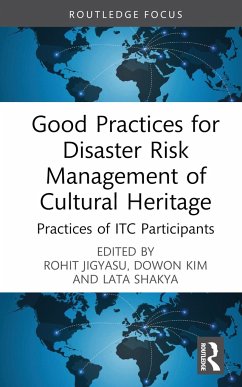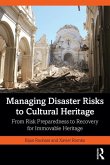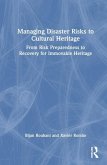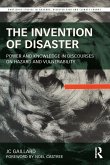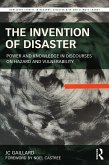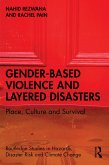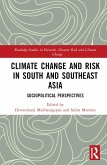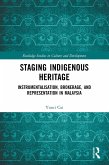Good Practices for Disaster Risk Management of Cultural Heritage
Practices of ITC Participants
Herausgeber: Kim, Dowon; Jigyasu, Rohit; Shakya, Lata
Good Practices for Disaster Risk Management of Cultural Heritage
Practices of ITC Participants
Herausgeber: Kim, Dowon; Jigyasu, Rohit; Shakya, Lata
- Gebundenes Buch
- Merkliste
- Auf die Merkliste
- Bewerten Bewerten
- Teilen
- Produkt teilen
- Produkterinnerung
- Produkterinnerung
This book is a selection of case studies undertaken by cultural heritage and disaster risk management professionals across the world demonstrating good practices for disaster risk management of cultural heritage.
Andere Kunden interessierten sich auch für
![Managing Disaster Risks to Cultural Heritage Managing Disaster Risks to Cultural Heritage]() Managing Disaster Risks to Cultural Heritage45,99 €
Managing Disaster Risks to Cultural Heritage45,99 €![Managing Disaster Risks to Cultural Heritage Managing Disaster Risks to Cultural Heritage]() Managing Disaster Risks to Cultural Heritage162,99 €
Managing Disaster Risks to Cultural Heritage162,99 €![The Invention of Disaster The Invention of Disaster]() JC GaillardThe Invention of Disaster162,99 €
JC GaillardThe Invention of Disaster162,99 €![The Invention of Disaster The Invention of Disaster]() JC GaillardThe Invention of Disaster47,99 €
JC GaillardThe Invention of Disaster47,99 €![Gender-Based Violence and Layered Disasters Gender-Based Violence and Layered Disasters]() Nahid Rezwana (Bangladesh University of Dhaka)Gender-Based Violence and Layered Disasters44,99 €
Nahid Rezwana (Bangladesh University of Dhaka)Gender-Based Violence and Layered Disasters44,99 €![Climate Change and Risk in South and Southeast Asia Climate Change and Risk in South and Southeast Asia]() Climate Change and Risk in South and Southeast Asia144,99 €
Climate Change and Risk in South and Southeast Asia144,99 €![Staging Indigenous Heritage Staging Indigenous Heritage]() Yunci Cai (UK University of Leicester)Staging Indigenous Heritage48,99 €
Yunci Cai (UK University of Leicester)Staging Indigenous Heritage48,99 €-
-
-
This book is a selection of case studies undertaken by cultural heritage and disaster risk management professionals across the world demonstrating good practices for disaster risk management of cultural heritage.
Produktdetails
- Produktdetails
- Routledge Studies in Hazards, Disaster Risk and Climate Change
- Verlag: Taylor & Francis Ltd
- Seitenzahl: 150
- Erscheinungstermin: 27. Juni 2023
- Englisch
- Abmessung: 223mm x 145mm x 16mm
- Gewicht: 326g
- ISBN-13: 9781032411446
- ISBN-10: 1032411449
- Artikelnr.: 67824499
- Routledge Studies in Hazards, Disaster Risk and Climate Change
- Verlag: Taylor & Francis Ltd
- Seitenzahl: 150
- Erscheinungstermin: 27. Juni 2023
- Englisch
- Abmessung: 223mm x 145mm x 16mm
- Gewicht: 326g
- ISBN-13: 9781032411446
- ISBN-10: 1032411449
- Artikelnr.: 67824499
Rohit Jigyasu is a conservation architect and risk management professional from India, currently working at ICCROM as a Project Manager on Urban Heritage, Climate Change and Disaster Risk Management. He is also the Vice President of ICOMOS International Scientific Committee on Risk Preparedness (ICORP). Rohit served as UNESCO Chair holder professor at the Institute for Disaster Mitigation of Urban Cultural Heritage at Ritsumeikan University, Kyoto, Japan, where he was instrumental in developing and teaching the International Training Course on Disaster Risk Management of Cultural Heritage. He was the elected President of ICOMOS India from 2014 to 2018 and president of the ICOMOS International Scientific Committee on Risk Preparedness (ICORP) from 2010 to 2019. Rohit served as the Elected Member of the Executive Committee of ICOMOS since 2011 and was its Vice President from 2017 to 2020. Before joining ICCROM, Rohit worked with several national and international organisations such as UNESCO, UNISDR, Getty Conservation Institute, and World Bank for consultancy, research, and training on Disaster Risk Management of Cultural Heritage. Dowon Kim is an associate professor at the Department of Civil and Environmental Engineering, Ritsumeikan University and a UNESCO Co-Chair holder professor at the Institute of Disaster Mitigation for Urban Cultural Heritage, Ritsumeikan University (R-DMUCH). Since 2014, he has been conducting and organising the International Training Course (ITC) on Disaster Risk Management of Cultural Heritage. His current research focuses on community design of disaster risk management in historical districts nationally and internationally. As for international contribution, he works for the International Scientific Committee on Risk Preparedness (ICORP) of ICOMOS. The main objective of his research is sharing the best practices of the urban and local communities' sustainability and cultural/social identity, with the method of analytics, field investigation, and communication tools development, and theorising these practices to transfer to the global context. Moreover, he is interested in disaster mitigation planning to balance heritage conservation, using traditional knowledge and community practices in urban heritage. Lata Shakya is an associate professor at the Institute of Disaster Mitigation for Urban Cultural Heritage R-DMUCH, Ritsumeikan University. She has been serving as a coordinator of the International Training Course on Disaster Risk Management of Cultural Heritage since 2020. She received her doctoral degree in Urban and Environmental Engineering from Kyoto University and pursued postdoctoral research at the University of Tokyo, Department of Architecture, as a Japan Society for the Promotion of Science postdoctoral fellow and project researcher from 2013 to 2017. Her research focuses on community resilience to disasters and the sustainability of historic cities. She has conducted research in various urban and rural areas of Nepal and Japan. Her primary field area is the historic city of Patan in Nepal, a courtyard-style settlement that originated from Buddhist monasteries. She is currently involved in disaster mitigation planning of different communities in Patan through workshops with the local community. She is the co-author and coordinator of the book 'The Memory of 2015 Nepal Earthquake, the Experience of Local Residents Utilizing Traditional Resources in UNESCO World Heritage Site' (2019) and a co-author of the book 'Rural and Urban Sustainability Governance' (2014). She was awarded 'The Encouragement Prize of AIJ (Architectural Institute of Japan)', the Doctoral Dissertation Award from Association of Urban Housing Sciences in 2014, and the first JUSOKEN Doctoral Dissertation Award in 2016.

